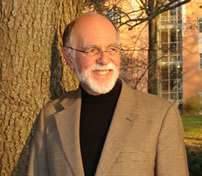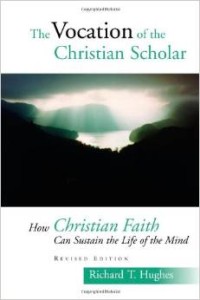We continue our guest series from Richard Hughes on the vocation of Christian scholars. The following post is adapted from Richard’s book, The Vocation of a Christian Scholar: How Christian Faith Can Sustain the Life of the Mind (Eerdmans, 2005).

In the first post of this series, I made the point that “those of us who are both Christians and scholars will inevitably live in the midst of a deep and inescapable paradox.”
The paradox is this – that as Christians, we are committed to a highly particularistic notion of truth while, as scholars, we are committed to the life of the mind which calls us to pursue truth wherever it may lead.
So our question today is this: can Christians serve as serious scholars? Put another way, can Christian faith equip us for the life of the mind? Can Christian faith equip us to pursue truth wherever that pursuit may lead? And can Christian faith empower us to engage in a serious way a wide range of conversation partners, even when those partners hold positions that may threaten our most cherished beliefs?
How we answer those questions depends upon two things:
- How we understand the Christian faith, and
- How we understand the nature of the biblical text.
What About Christian Faith?
From the outset, we must admit that Christian faith will invariably stand at odds with the life of the mind if we envision both our faith and the Bible in terms of absolutistic principles, sterile legal codes, or moral imperatives that require from us no reflection, no creativity, and no imagination.
But dynamic Christian faith—the kind of faith that can sustain the life of the mind—requires us to embrace the theme of paradox that stands at the heart of the Christian gospel—a theme we explored in the first post of this series. Dynamic Christian faith demands that we make connections—connections that can open up dialogue between our faith and the world in which we live. And dynamic Christian faith requires that we ask about the meaning of our faith in relation to human culture.
The crucial words and phrases in the previous paragraph are these—“connections,” “dialogue,” and “meaning in relation to.” Those words and phrases are crucial since, if we hope to serve as faithful Christian scholars, we must ask, for example, about the meaning of God’s sovereignty in relation to politics and education, about the meaning of God’s love in relation to human relationships, about the meaning of God’s wrath in relation to peace and justice, about the meaning of creation in relation to the environment, about the meaning of the cross in relation to materialism and poverty, and on and on we could go.
In a word, dynamic Christian faith requires that we learn to make connections and to think creatively about the meaning of what we believe. We call this kind of thinking, “theology,” and if we have any hope that Christian faith might sustain the life of the mind, every Christian scholar must learn to work as a theologian in his or her own right.
Theological work, however, is not the same as Bible study. One can study the Bible simply to learn biblical facts and never embrace theological work at all. We do theology only when we begin to reflect creatively on the meaning of the biblical text. And it is only when we ask in creative and imaginative ways about the relation of the biblical message to the world in which we live—it is only then that Christian faith can sustain the life of the mind.
What About the Bible?

In order to reflect creatively on the meaning of the biblical text, however, we must first be clear on what kind of book the Bible really is. If we conceive of the Bible as nothing more than a rule book, or a scientific manual, or a legal code, or a divinely-authored constitution whose contents we can master with sufficient diligence, then there is very little room for creative reflection on the meaning of the biblical text. In fact, there is very little room for interpretive work at all. For in this scenario, the Bible simply means what it says and says what it means with clarity and scientific precision. If we view the Bible in these terms, then we can only view as perverse those who disagree with our particular reading of the biblical text—or those who disagree with our understanding of the world in which we live.
Indeed, if we view the Bible in these terms, there can be no disciplined search for truth, for truth has already been defined. There can be no serious conversation with people who represent a diversity of cultural and religious perspectives, since we know in advance that people who hold perspectives different from our own have nothing to contribute to the conversation in any event. Critical thinking that discriminates between competing worldviews and perspectives is finally pointless since we have rejected competing worldviews and perspectives from the outset. And creativity falls by the wayside as well, since creativity is nurtured by imaginative inquiry, not by codified legal constraints.
But the Bible is not primarily a rule book, a scientific manual, a legal code, or a divinely-authored constitution. Rather, the Bible is chiefly a theological text, that is, a book whose subject is God. Accordingly, the Bible invites each of us to reflect on the meaning of that which transcends our understanding—the infinite Lord of the universe. Precisely because the subject of the Bible—the living God—transcends our poor ability to understand, it calls on each of us to respond with wonder, creative imagination, and rational inquiry.
Two points flow from this conception of the biblical text. First, if the Bible is, indeed, the sort of text we have described, then it must be obvious that the Bible requires interpretation and that no one can legitimately claim a corner on the market of God’s truth. And second, if the Bible is a theological text—a book about God—it calls on every Christian to serve as a theologian, that is, one who thinks deeply about the meaning of God and the meaning of the Christian faith.
What About Christian Scholars?
Unfortunately, however, many Christian scholars have never learned to think theologically about the meaning of the Christian faith. Though highly educated in narrow specialties, many Christian scholars essentially remain at a Sunday school level of theological literacy. That is one reason why Christianity and the life of the mind so often seem at odds, even at many Christian institutions of higher learning. And that is one reason why so many Christian scholars, even those who want to integrate Christian faith and scholarship in meaningful and productive ways, find it difficult to do so.
The truth is, the successful integration of faith and learning demands a certain level of theological literacy and expertise. Otherwise, all our attempts to relate faith to learning will inevitably prove abortive.
In our next two posts, we will consider how some of the great theological motifs in the Bible can both equip and liberate Christian scholars to embrace the life of the mind, to make important connections between their faith and the world in which they live, and to dialogue with those with whom they may disagree.
As Christian scholars, we can aspire to nothing less.
Richard T. Hughes has spent over 40 years working at the intersection of religion and culture in the United States. Under that broad panoply of interests, he has taught and published on (1) the biblical vision of peace and justice, (2) Christianity and America’s self-understanding, (3) the relationship between Christianity and higher education/the life of the mind, (4) the history of Christian primitivism in America, and (5) the history of Churches of Christ in America.
With a Ph.D. in the history of Christianity since 1500, Hughes has taught at Pepperdine University, Southwest Missouri State University, and Abilene Christian University. He currently serves as Distinguished Professor of Religion and Director of the Sider Institute for Anabaptist, Pietist, and Wesleyan Studies at Messiah College in Grantham, Pennsylvania.

Thank. You.
Thank you; well said! The issues are complex. Even the statement “the Bible requires interpretation” must itself be interpreted, in a way that recognizes that we already approach life with some hermeneutic commitments, biblical or otherwise, recognized or not. I have tried to teach my own students that every Christian is called to be a theologian in the sense you describe–and this is quite a new idea for some!
In my book The Faith Equation, I make frequent appeal for Christians to use their minds to both expand their knowledge of the faith and to be able to share their faith with others. You also mention paradox, which I have devoted two chapters of the book to. Great article, I will be sharing with my readers.
–Dr. Marvin Bittinger